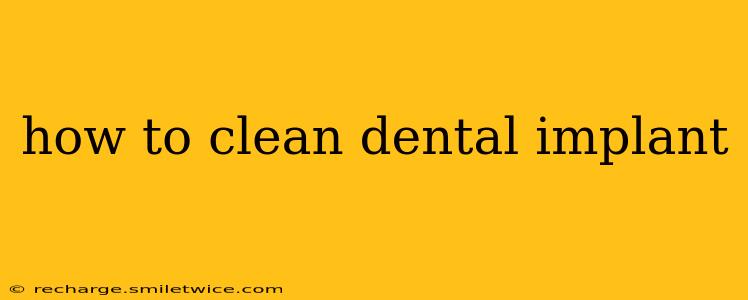Dental implants offer a fantastic solution for missing teeth, restoring your smile and confidence. However, maintaining optimal oral hygiene around your implants is crucial for their long-term health and success. Neglecting proper cleaning can lead to peri-implantitis, a serious infection that can ultimately result in implant failure. This guide will walk you through the best practices for cleaning your dental implants and ensuring their longevity.
What Makes Cleaning Dental Implants Different?
Unlike natural teeth, dental implants lack the natural periodontal ligament and surrounding bone that helps protect against infection. This makes them more susceptible to peri-implantitis, an inflammation of the tissues surrounding the implant. Therefore, meticulous cleaning is paramount.
How to Clean Dental Implants: A Step-by-Step Guide
The key to successful implant maintenance is a consistent and thorough cleaning routine. Here’s a detailed guide:
1. Brushing:
- Use a soft-bristled toothbrush: This is crucial to avoid scratching the implant surface. Hard bristles can damage the implant and the surrounding gum tissue.
- Brush gently but thoroughly: Use gentle, circular motions to clean all surfaces of the implant and the surrounding teeth. Pay special attention to the gum line.
- Choose the right toothpaste: Use a fluoride toothpaste; this helps protect the surrounding natural teeth from decay. Avoid abrasive toothpastes.
- Brush twice a day: Morning and night are ideal times, but consistency is key.
2. Flossing:
- Use floss or interdental brushes: Traditional floss can be challenging to use around implants. Interdental brushes (small cylindrical brushes) are often a better option for cleaning between implants and adjacent teeth.
- Gently guide the floss or brush: Avoid snapping or forcing the floss or brush, as this could damage the gum tissue.
- Clean all interdental spaces: Ensure you reach every space between the implant and adjacent teeth.
3. Using an Antimicrobial Mouthwash:
- Choose a mouthwash recommended by your dentist: Some mouthwashes can help control plaque and gingivitis, reducing the risk of peri-implantitis. Always follow the directions on the label.
- Rinse twice daily: Use after brushing and flossing.
4. Regular Dental Checkups:
- Schedule professional cleanings: Regular visits to your dentist are essential for maintaining the health of your implants. Professional cleanings remove plaque and tartar that you might miss at home. These checkups are critical for early detection of any issues.
What are the Best Tools for Cleaning Dental Implants?
Many tools can aid in cleaning dental implants effectively. Your dentist can advise on which tools are best suited to your specific situation and implant type. Common options include:
- Soft-bristled toothbrushes: Look for toothbrushes specifically designed for sensitive gums.
- Interdental brushes: These are available in various sizes to fit different spaces.
- Dental floss: Use unwaxed floss if you choose this option.
- Water flosser (irrigator): This can help remove food particles and plaque, particularly in hard-to-reach areas.
How Often Should I Clean My Dental Implants?
You should clean your dental implants twice a day, just as you would your natural teeth. This includes brushing, flossing, and rinsing with an antimicrobial mouthwash.
What Happens if I Don't Clean My Dental Implants Properly?
Improper cleaning of dental implants significantly increases your risk of peri-implantitis. This infection can lead to bone loss around the implant, loosening, and ultimately, implant failure. Early signs of peri-implantitis include redness, swelling, and bleeding around the implant. If you notice any of these signs, contact your dentist immediately.
Can I Use Electric Toothbrushes for Cleaning My Dental Implants?
Yes, electric toothbrushes can be used to clean dental implants. However, ensure you choose a toothbrush with a soft brush head and use a gentle brushing technique.
What are the Long-Term Effects of Neglecting Dental Implant Cleaning?
Long-term neglect of dental implant hygiene can result in severe peri-implantitis, potentially leading to implant loss and the need for extensive and costly restorative procedures. It is far more cost-effective and less invasive to maintain a meticulous cleaning routine.
By following these guidelines and prioritizing regular dental checkups, you can significantly extend the life and success of your dental implants. Remember, prevention is key, and consistent care is the best way to maintain a healthy and beautiful smile for years to come.
